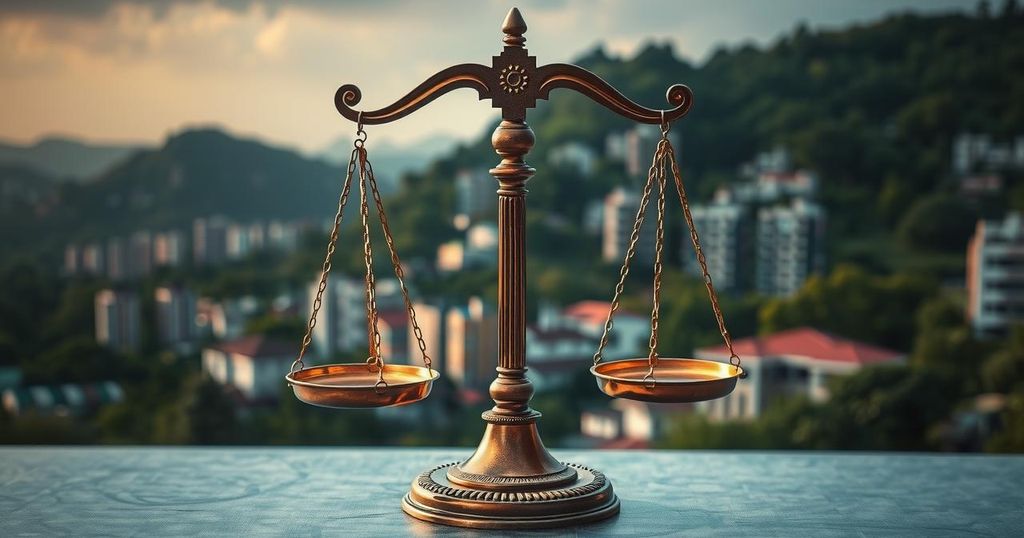Nigeria’s Ongoing Battle Against Drug Abuse and Trafficking
Nigeria is grappling with a severe drug crisis highlighted by recent violence against NDLEA officers, particularly the lynching of Officer Aliyu Imran. The NDLEA has made significant strides in combating drug trafficking, arresting thousands and seizing millions of kilograms of drugs. However, the ongoing drug abuse epidemic necessitates a unified response from governmental and law enforcement bodies to address the widespread socio-economic consequences.
Nigeria is confronting a significant drug crisis that can no longer be overlooked. A recent incident in Gadan-Gayan, Kaduna State, tragically illustrated the dangers faced by the National Drug Law Enforcement Agency (NDLEA). An officer, Aliyu Imran, was lynched while carrying out enforcement duties, underscoring the perilous conditions under which agents operate to combat substance abuse and drug trafficking. Failure to address this drug menace threatens the safety and wellbeing of society.
The NDLEA, led by Chairman Buba Marwa, has suffered immense losses, having lost hundreds of officers since its founding in 1989. Officer Imran’s death was particularly brutal; while pursuing a suspected drug dealer, the suspect collided with a crowd, resulting in fatalities and provoking mob violence against Imran. Many NDLEA officers have met similar fates over the years, emphasizing the dangerous reality of tackling drug-related issues in Nigeria.
Despite these challenges, the Nigerian government has persevered in combating drug abuse and trafficking. The NDLEA has utilized intelligence-driven operations resulting in significant drug seizures across the nation, particularly in notable locations like ports and transit points. They have actively engaged in public awareness campaigns, thorough searches, and vehicle inspections to diminish drug abuse prevalence.
Recent data from the NDLEA indicates a high incidence of drug abuse in Nigeria, particularly in the South-West region. Over 57,792 drug traffickers have been arrested in the last four years, including 65 major drug lords, with over 9.9 million kilograms of drugs seized. This data not only reflects the scale of drug problems but also highlights the persistent efforts of the NDLEA in combating these issues in 2024.
The UN categorizes drug abuse as the dangerous and illicit use of psychoactive substances, which has led to numerous socio-economic issues, including increased violence and health crises in Nigeria. Approximately 14.4 percent of people aged between 15 and 64 engage in drug use, posing dire public health risks and potential drug epidemics, compounded by the country being a significant consumer and exporter of these substances.
Practitioners of the illegal drug trade continue to devise new methods for trafficking, and the problem has seeped into educational institutions, exposing students to drug-laced edibles at social gatherings. The growing participation of various demographics in drug trafficking is alarming, as even law-abiding individuals may engage in transporting drugs despite the severe penalties associated with such activities.
The National Drug Control Masterplan has highlighted various drugs of concern, including cannabis, cocaine, and synthetic opioids like tramadol, which has seen increased misuse in the region. The alarming rise in the production and trafficking of these substances necessitates a vigilant and coordinated response from law enforcement agencies to eradicate drug-related challenges.
The NDLEA reports a notable statistic: one in four drug users in Nigeria is a woman, an issue that often goes unreported due to stigma. This presents significant challenges in addressing drug abuse amongst women, highlighting the need for targeted interventions that consider gender disparities in substance abuse.
The global drug trade generates an estimated $360 billion annually, with significant portions stemming from Africa, particularly in narcotics markets within Nigeria. Despite the improvements witnessed under the NDLEA’s leadership, the agency must remain vigilant and pursue both low-level offenders and major traffickers effectively. Cooperation with the judicial system is essential to ensure strict penalties for drug-related offenses.
With advancements in technology, the Bola Tinubu administration is encouraged to support the NDLEA in enhancing its strategies and capabilities against drug trafficking, ensuring a more effective and robust response to this multifaceted crisis.
In summary, Nigeria faces a significant drug crisis, exacerbated by violence against enforcement officers and the growing prevalence of substance abuse across various demographics. The NDLEA has made commendable strides in combating this issue, evidenced by numerous arrests and drug seizures. However, the persistent challenges of trafficking and consumption necessitate further support from the government and technological advancements to bolster enforcement strategies. The comprehensive approach to addressing drug-related problems in Nigeria is crucial for a safer and healthier society.
Original Source: punchng.com




Post Comment